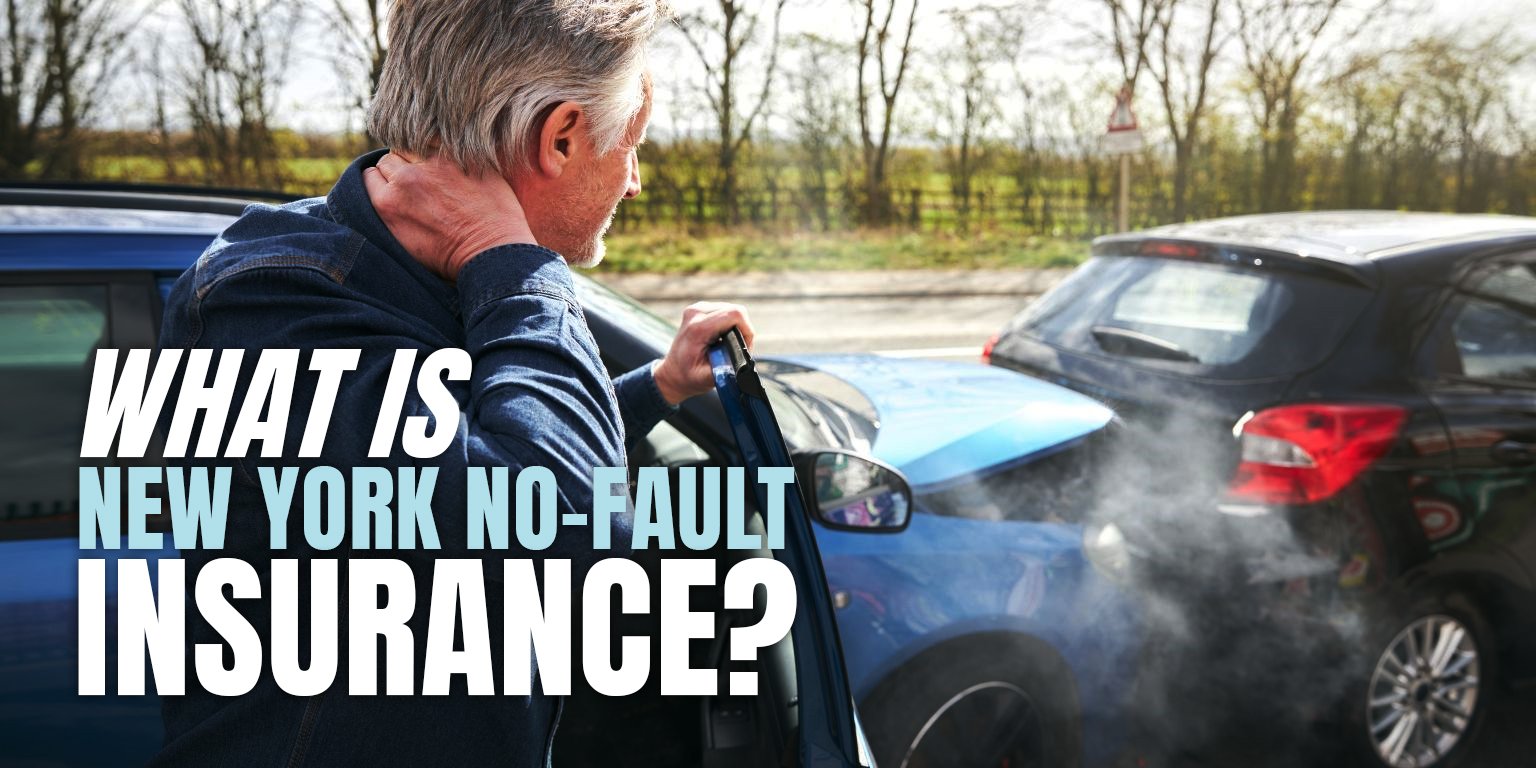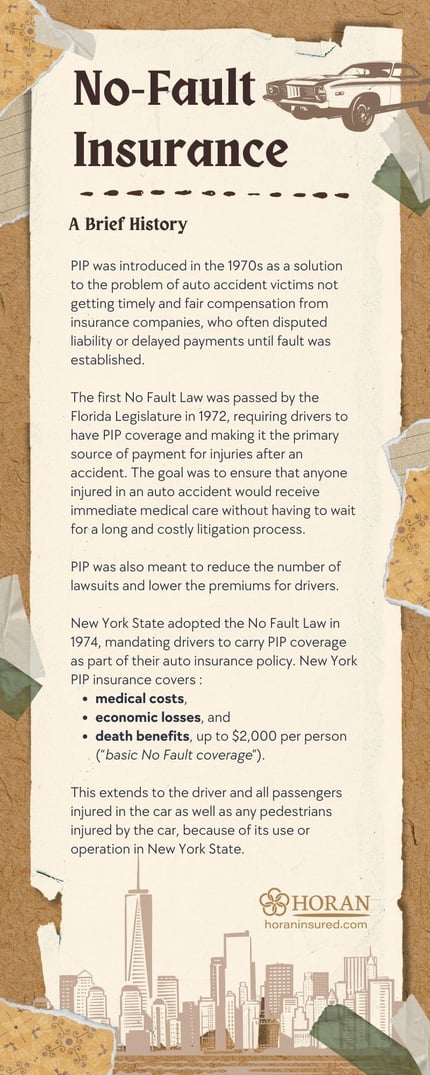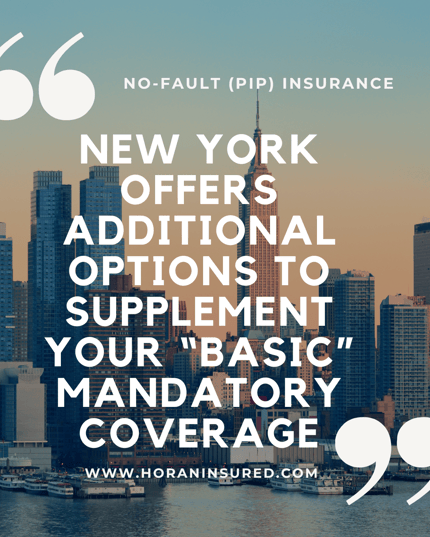What is New York No-Fault Insurance?
March 29th, 2024 | 7 min read

Been in a car accident in New York? No matter who caused it, medical bills and lost wages can quickly derail your life. But you don't have to face financial hardship alone.
New York's No-Fault insurance, also known as Personal Injury Protection (PIP), is a mandatory part of your car insurance policy. It's designed to provide swift and essential financial support after an accident, regardless of who's to blame.
The Horan insurance agency has been helping CNY drivers maximize no-fault insurance since 2009. We understand the stress and uncertainty that follow an accident. We're here to help you navigate the complexities of PIP and ensure you have the coverage you deserve.
This article will guide you through everything you need to know about PIP, from who it covers and what it pays for to how it works and when you might need additional protection..
Understanding New York’s No-Fault Insurance
New York’s No-Fault insurance, also known as Personal Injury Protection (PIP), is a crucial part of your auto insurance policy. It’s designed to provide swift and necessary economic support to anyone injured in a car accident, regardless of who caused it.
This coverage ensures that medical expenses and other related costs are taken care of without the need to establish fault, which can often be a lengthy and contentious process.
Here’s how it works: if you’re involved in a car accident, PIP kicks in to cover medical bills, lost earnings, and other incidental costs up to the limit of your policy. It’s a safety net that protects you financially, allowing you to focus on recovery rather than the stress of expenses.
For instance, let’s say you’re cruising along I-690 through Syracuse and suddenly, you’re sideswiped by a car that didn’t see you as they merged. You’re shaken up and injured, but thankfully, you have PIP.
You file a claim, and your insurer starts covering your medical treatments right away. They’re not waiting to find out who’s to blame. They’re making sure you’re getting the care you need immediately.
That’s the beauty of No-Fault insurance
- it’s straightforward,
- it’s efficient, and
- it’s there for you when you need it most.
So, while the term ‘No-Fault’ might have led to some confusion, its purpose is clear: to provide quick and comprehensive support, no matter the circumstances of the accident.
Who’s Covered by No-Fault Insurance or Personal Injury Protection?
PIP is a comprehensive aspect of your car insurance that extends far beyond the driver’s seat. It’s a policy-wide coverage that applies to nearly everyone who might drive or ride in your vehicle, provided by your insurance for each New York State registered vehicle.
Why do we say nearly everyone? Well, if you’re a New York resident and someone borrows your car, they’re covered under your PIP. But there’s a catch—if they’re not a New York resident and they take your car out of state, PIP won’t cover them in case of an accident.
Now, PIP is not only for drivers and passengers. It also covers pedestrians and cyclists. This means that if you’re driving and unintentionally hit a pedestrian, your PIP will be the first coverage to pay for the damages.
And there’s more. PIP isn’t just about you. It’s about your family too. It protects you and your immediate household family members if you’re injured while on any bus, including a school bus.
So, if your children ride the bus to school, you can have composure knowing that PIP will protect them. It’s reliable coverage for you and your family, ensuring that you’re ready for any accidents.
How No-Fault/Personal Injury Protection Supports You
 PIP, simplifies the aftermath of a car accident. It’s a mandatory part of your insurance that handles claims without the hassle of legal battles or disputes between insurance companies. PIP is there to ensure you have a smooth road to recovery.
PIP, simplifies the aftermath of a car accident. It’s a mandatory part of your insurance that handles claims without the hassle of legal battles or disputes between insurance companies. PIP is there to ensure you have a smooth road to recovery.
When PIP first came around in the 1970s, it became clear that the financial impact of an accident wasn’t just about medical bills. People were missing out on work and facing extra costs because of their injuries.
That’s why PIP offers a full range of benefits, capping at $50,000 per person. Remember, you might meet a deductible before PIP takes over. Some policies have a family deductible up to $200, so it’s worth checking yours.
To tap into your PIP benefits, you need to file a claim within 30 days of the accident. Here’s what PIP covers:
- Medical Expenses: PIP covers any medical expenses that result from the accident, such as paramedics, hospitals, doctors, and more. In case of death, PIP also provides a $2,000 benefit for final expenses.
- Loss of Income: Can’t work because of your injuries? PIP provides up to $2,000 a month. You can claim 80 percent of your lost income, but the payout is capped at $2,000 monthly. This benefit lasts for three years or until you hit the $50,000 limit. But you need to have medical expenses to access this benefit.
- Other Necessary Expenses: Accidents come with unexpected costs. Maybe you need help around the house or rides to appointments. PIP offers up to $25 a day for these kinds of expenses, as long as you have medical costs too.
Wondering About Health Insurance?
It’s a common question. Your health plan is secondary to PIP. You’ll need to exhaust your PIP coverage before your health insurance kicks in.
This is usually a good deal because health insurance doesn’t cover lost wages or other accident-related costs, and it often comes with high deductibles and copays. PIP spares you from those extra financial worries post-accident.
Expanding Your No-Fault Insurance Coverage in New York
 Have you ever considered that the basic $50,000 in No-Fault insurance is not enough? If so, New York offers additional options to supplement your mandatory coverage. These aren’t included by default—you’ll need to request them to beef up your policy. While there’s an extra cost, it’s typically small compared to the benefits you gain.
Have you ever considered that the basic $50,000 in No-Fault insurance is not enough? If so, New York offers additional options to supplement your mandatory coverage. These aren’t included by default—you’ll need to request them to beef up your policy. While there’s an extra cost, it’s typically small compared to the benefits you gain.
Optional Basic Economic Loss (OBEL)
Think of OBEL as your financial flex. It adds a flat $25,000 benefit to use for medical costs, lost wages, or other accident-related expenses. You choose where to apply it, but it can’t cover everything at once. Like PIP, OBEL extends to passengers and pedestrians involved in an accident.
Additional Personal Injury Protection (APIP)
APIP ups the ante on medical expense coverage. You can buy it in $25,000 increments, with $50,000 being the standard block. Most insurers cap it at $100,000.
APIP also boosts wage loss coverage. The standard PIP offers up to $2,000 per month, but APIP can raise that to $4,000 per month—still adhering to the 80 percent rule.
For example, if you make $5,000 per month, you’re eligible for up to 80 percent of that, which would be $4,000. But that’s the max, even if you earn more.
What about those extra costs that pop up? For those, APIP doubles the daily allowance from $25 to $50. If you’ve had to hire help post-accident, this can be a significant aid.
APIP Coverage On the Go
The best part? Your APIP coverage can come along for the ride in someone else’s car. If they have less PIP coverage than you, your APIP can kick in after theirs is used up. It’s like having a backup plan wherever you go.
When Can No-Fault Coverage Be Denied?
Your No-Fault insurance, or PIP, is a reliable form of coverage, but there are specific scenarios where an insurer might deny it. The rules are clear-cut, which helps avoid ambiguity.
Here’s who generally won’t be covered under No-Fault:
- Motorcycle riders: Whether you’re driving or just along for the ride, motorcycles aren’t covered.
- Impaired driving: If you’re caught driving under the influence, expect no coverage.
- Criminal activity: Committing a felony or trying to outrun the police? Your PIP won’t protect you.
- Stolen vehicles: Riding in a vehicle that’s stolen means you’re out of luck with PIP.
Do PIP Claims Affect Your Insurance Premium?
It’s a common concern: will filing a PIP claim hike up your insurance rates? Unfortunately, the answer is yes. Insurance companies may use your PIP claim history as a factor in determining your premium. If you or someone in your household has filed a PIP claim in the last 3 to 5 years, you might see a rise in your rates.
It’s a tough pill to swallow, especially since you’re obliged to use your insurance no matter who’s at fault. You could be minding your own business at a red light one moment and in an ambulance the next—all on your dime.
And if you’ve had several PIP claims in recent years, some insurers might even refuse to cover you. It’s a harsh reality, and while there’s not much you can do about it, being informed is the first step.
And remember, PIP claims are just one of many factors that can affect your car insurance premium. For a deeper dive, check out our comprehensive article on what insurers need to know to offer you a policy.
Legal Actions Beyond No-Fault Insurance
In New York, No-Fault insurance provides a layer of financial protection, but it has its limits. If you suffer severe injuries that surpass what PIP, OBEL, and APIP cover, you might consider taking legal action against the at-fault driver.
For instance, if you experience life-altering injuries—like losing a limb or suffering permanent disfigurement—you’re likely to face costs that exceed your insurance benefits. In such cases, suing the other driver becomes a viable option to cover the full extent of your damages.
However, if you’ve tapped into your APIP benefits, be aware that your insurer may have a right to reimbursement from any settlement or judgment you receive. This means the compensation you’re awarded could be reduced by the amount already paid out through APIP.
Checking Your PIP Coverage
Knowing the extent of your PIP coverage is essential. You can find this information on the declarations page of your insurance policy. This page will list all the coverages, including PIP, and show the total benefits available to you. If the listed amount is $50,000, then you have the basic mandatory coverage.
If you’re considering increasing your PIP coverage, it’s best to speak with your insurance agent. They can review your policy and explain the additional PIP options, helping you make an informed decision about your insurance needs.
Take Control of Your No-Fault Insurance by Maximizing Coverage
Accidents happen. They can leave you shaken, injured, and facing a mountain of medical bills and lost wages. But imagine this: you're recovering from your injuries, focusing on healing, and not worrying about the financial burden. That's the power of understanding your No-Fault coverage.
Now, imagine the alternative. You're dealing with the physical and emotional toll of the accident, while simultaneously battling a financial struggle. Medical bills pile up, lost wages strain your budget, and the stress takes a heavy toll.
Taking control of your No-Fault coverage is an investment in your future well-being. It's about ensuring you have the support you need to heal, both physically and financially. The experienced agents at Horan are here to guide you through the process and help you make informed decisions.
Don't wait until an accident happens. Be prepared by clicking the Get a Quote button below.
Daniel is an accomplished content creator. He has been working in publishing for almost two decades. Horan Companies hired Daniel as its content manager in November 2022. The agency entrusted its messaging to him. Since then, Daniel has written insurance articles, service and pillar pages, and more. All in an effort to educate CNY readers. He's helping them understand the world of insurance so they can make informed decisions.
Topics:
.png?width=207&height=55&name=Horan_Logo%20Transparent%20No%20Tagline%20(2).png)

